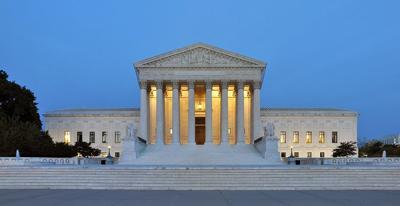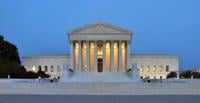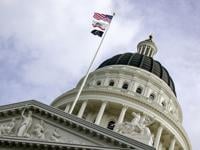
U.S. Supreme Court
WASHINGTON, D.C. - A Hawaii state law that bans people from carrying guns in the vast majority of public and private spaces is headed for a Second Amendment showdown before the nation's highest court.
And the fallout from whatever decision is handed down by the U.S. Supreme Court could also affect a currently blocked state law in California that largely mirrors Hawaii's statute, potentially preventing Golden State Democrats from attempting to resurrect their desired strict restrictions on the carry of firearms.
On Oct. 3, the U.S. Supreme Court granted a petition sought by Hawaii gun owners and Second Amendment rights advocates in an appeal of the ruling from the San Francisco-based U.S. Ninth Circuit Court of Appeals.
The high court's grant will give them the chance to argue the Ninth Circuit wrongly agreed Hawaii's gun carry restrictions effectively make it impossible to legally carry a firearm anywhere outside the home on the islands, all but eviscerating any practical constitutional right to carry a handgun for self defense.
The court has not yet set a hearing date for the case, but is expected to hear arguments sometime during its 2025-2026 term.
The case would center on a state law enacted by Aloha State Democrats that imposes sharp new limits on the ability of people to carry firearms in nearly every public or private space, other than at home or on public streets.
That law, and others like it in California and other Democrat-dominated states, were passed in 2023 in the wake of the U.S. Supreme Court's decision known as New York State Pistol and Rifle Association v Bruen.
In that decision, the Supreme Court appeared to move to make it more difficult for states and other governments to impose restrictions on Americans' Second Amendment rights to keep and bear arms. The Bruen ruling barred states from banning gun ownership or restricting carry rights, unless the states can demonstrate the regulations are in keeping with America's history and tradition dating back to the ratification of the Second Amendment in 1791 and Fourteenth Amendment following the Civil War.
Following that ruling, Democrats across the country sought to enact so-called Bruen response laws to push back on the broadening of Second Amendment rights and reassert restrictions on American gun owners.
In California and Hawaii, among other states, lawmakers specifically sought to exploit a carveout seemingly allowed by the Supreme Court for gun restrictions for "sensitive places." The Supreme Court specifically cited examples like courthouses and schools as such potential "sensitive places."
In California and Hawaii, lawmakers used their new laws to rewrite the rules on concealed carry, creating a long list of "sensitive places" at which concealed carry would be outright prohibited by law, including schools; courthouses; banks; hospitals; parks; playgrounds; stadiums; museums; amusement parks; public transit stations, as well as trains and buses; churches and other houses of worship; restaurants and bars; and many other places.
The laws also rewrote the so-called "default rule" on when concealed carry would be allowed on private property.
While private property owners had long held the right to forbid firearms on their property, the new laws flipped the presumption entirely around, blocking gun owners from carrying lawfully concealed firearms onto private property, unless the property owner specifically gives written permission or posts a sign welcoming concealed carry.
After receiving a rough reception in district court, the laws found a more receptive audience on appeal at the Ninth Circuit.
There, judges allowed Hawaii's rules to stand, but blocked California's "default rule," because, they said, California went too far by requiring property owners to prominently and explicitly state if people were allowed to carry firearms on their property, essentially as a kind of warning to the public.
After the Ninth Circuit refused to reconsider the ruling, some of the appeals court's judges issued sharp dissents, saying the default gun carry rules had "effective disarmed law-abiding Hawaiians and Californians."
The question over Hawaii's law was then brought to the U.S. Supreme Court, with Hawaii gun owners and others arguing the Ninth Circuit's ruling not only violates the Second Amendment and mangles the Bruen ruling, but also conflicts with a different federal appeals court.
In a case challenging a similar default carry ban passed by New Jersey, the U.S. Second Circuit Court of Appeals found such rules violate the Second Amendment.
At the Supreme Court, challengers to the Hawaii law found support from the Justice Department under President Donald Trump.
In a brief filed at the Supreme Court, the Justice Department urged the high court to take up the case, agreeing the Ninth Circuit had twisted and trampled the Second Amendment and the Bruen ruling in upholding Hawaii's rules.
"... Hawaii’s default rule functions as a near-complete ban on public carry. A person carrying a handgun for self-defense commits a crime by entering a mall, a gas station, a convenience store, a supermarket, a restaurant, a coffee shop, or even a parking lot," the Justice Department wrote.
"... Hawaii’s novel default rule defies - indeed, effectively nullifies - the 'general right to publicly carry arms' that Bruen recognized. Someone carrying a firearm for self-defense cannot run errands without fear of criminal sanction. In practice, only 'those who aimlessly wander the streets' may exercise their right to bear arms.
"That is no accident. The structure and operation of Hawaii’s law reveal that the law serves no legitimate purpose and instead seeks only to inhibit the exercise of the right to bear arms," the Justice Department wrote.
Hawaii had argued the high court shouldn't take up the case, because the legal challenge had not reached a final resolution. Rather, the appeal had been raised on a so-called interlocutory posture - meaning, a question of law - as the challengers seek to reverse only a denial of their attempt to block the law from being enforced while the direct legal challenge to the law itself continues in the lower courts.
As the Supreme Court typically rejects such appeals from cases in such preliminary proceedings, the high court's grant caught some observers by surprise, particularly among the Second Amendment community.
To date, the high court had largely rejected a growing list of appeals from Second Amendment rights supporters, who have suffered numerous defeats in federal appeals courts against their challenges to an assortment of gun ban laws in Democratic states, like California.
The Ninth Circuit has particularly repeatedly ruled to uphold gun ban laws in California and other states, even repeatedly taking the once-rare step to use en banc review to vacate rulings from their colleagues when smaller panels of Ninth Circuit judges sided with gun owners and against the state laws.
In the Hawaii case, the challengers - identified as Jason Wolford, Alison Wolford, Atom Kasprzycki and the Hawaii Firearms Coalition - are represented by attorneys Kevin O'Grady, of Honolulu, and Alan Alexander Beck, of San Diego.






